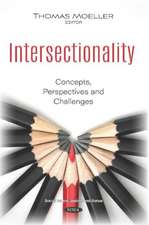Self-theories: Their Role in Motivation, Personality, and Development (Essays in Social Psychology): Essays in Social Psychology
Autor Carol S. Dwecken Limba Engleză Paperback – 2000
* How these patterns originate in people's self-theories
* Their consequences for the person -- for achievement, social relationships, and emotional well-being
* Their consequences for society, from issues of human potential to stereotyping and intergroup relations
* The experiences that create them
This outstanding text is a must-read for researchers in social psychology, child development, and education, and is appropriate for both graduate and senior undergraduate students in these areas.
Preț: 347.48 lei
Nou
Puncte Express: 521
Preț estimativ în valută:
66.49€ • 69.42$ • 55.03£
66.49€ • 69.42$ • 55.03£
Carte disponibilă
Livrare economică 15-29 martie
Livrare express 01-07 martie pentru 26.71 lei
Preluare comenzi: 021 569.72.76
Specificații
ISBN-13: 9781841690247
ISBN-10: 1841690244
Pagini: 212
Ilustrații: black & white illustrations
Dimensiuni: 156 x 234 x 11 mm
Greutate: 0.3 kg
Ediția:New.
Editura: Taylor & Francis
Colecția Psychology Press
Seria Essays in Social Psychology
Locul publicării:Oxford, United Kingdom
ISBN-10: 1841690244
Pagini: 212
Ilustrații: black & white illustrations
Dimensiuni: 156 x 234 x 11 mm
Greutate: 0.3 kg
Ediția:New.
Editura: Taylor & Francis
Colecția Psychology Press
Seria Essays in Social Psychology
Locul publicării:Oxford, United Kingdom
Cuprins
Preface. Introduction. 1. What Promotes Adaptive Motivation? Four Beliefs and Four Truths about Ability, Success, Praise, and Confidence. 2. When Failure Undermines and When Failure Motivates: Helpless and Mastery-Oriented Responses. 3. Achievement Goals: Looking Smart vs. Learning. 4. Is Intelligence Fixed or Changeable? Students' Theories About Their Intelligence Foster Their Achievement Goals. 5. Theories of Intelligence Predict (and Create) Differences in Achievement. 6. Theories of Intelligence Create High and Low Effort. 7. Theories and Goals Predict Self-Esteem Loss and Depressive Reactions. 8. Why Confidence and Success Are Not Enough. 9. What Is IQ and Does It Matter? 10. Believing in Fixed Social Traits: Impact on Social Coping. 11. Judging and Labeling Others: Another Effect of Implicit Theories. 12. Belief in the Potential to Change. 13. Holding and Forming Stereotypes. 14. How Does It All Begin? Young Children's Theories about Goodness and Badness. 15. Kinds of Praise and Criticism: The Origins of Vulnerability. 16. Praising Intelligence: More Praise that Backfires. 17. Misconceptions about Self-Esteem and about How to Foster It. 18. Personality, Motivation, Development, and the Self: Theoretical Reflections. 19. Final Thoughts on Controversial Issues.
Recenzii
"Based on extensive research with children and young adults, this book examines adaptive and maladaptive cognitive-motivational patterns and shows how these patterns originate in people's self theories; their consequences for one's achievment, social relationships, and emotional well-being; thier consequences for society; and the experiences that create these cognitive-motivational patterns." -- Resources in Education
"What we have here is no ordinary scholarly psychology volume. Ever so rarely, we are offered a psychology book that is so beautifully written, lucidly organized, and elegant in its description of ideas... I see many uses for this wonderful volume. Instead of having to put together a rather large stack of reprints to introduce students to her groundbreaking work, I now can refer them to something far better -- the author's view of how her work has developed over the years." -- Journal of Social and Clinical Psychology
"[This book] describes pathbreaking research in a style that is accessible to many audiences. It calls into question some of the most widely-held beliefs . . . about effective practices for maximizing children's self-confidence and learning." -- Deborah Stipek, UCLA
"The book is central to basic issues in social, personality, and developmental psychology. Indeed, it is like a guided tour through the scenic terrain of Carol's fascinating program of research. The writing is lively and engaging and the organization is unusually clear. The examples are well-chosen and intuitively compelling; they are easy to relate to our own lives and to the people that we know." -- Diane N. Ruble, New York University
"[This book] is simply among the best book in psychology I've read during the past year or two. It's superb. . . I could hardly put [it] down." -- Robert J. Sternberg , Yale University
"The book is central to basic issues in social, personality, and developmental psychology. Indeed, it is like a guided tour through the scenic terrain of Carol's fascinating program of research. The writing is lively and engaging and the organization is unusually clear. The examples are well-chosen and intuitively compelling; they are easy to relate to our own lives and to the people that we know." -- Diane N. Ruble, New York University
"[T]his is an important book addressing fundamental problems of enduring interest. [W]e think Self-Theories should be read by anyone with a serious interest in children's motivation, academic achievement or social development." -- Human Development
"This book does a great deal to undo the damage done by psychology books which have emphasised the importance of intelligence and of fixed stages which pupils and students cannot move out of, or work beyond... The contents of this delightful affirming book should be known to every teacher and every pupil, and most of all to every teacher trainer. -- David Turner, University of Glamorgan." -- Book Review
"What we have here is no ordinary scholarly psychology volume. Ever so rarely, we are offered a psychology book that is so beautifully written, lucidly organized, and elegant in its description of ideas... I see many uses for this wonderful volume. Instead of having to put together a rather large stack of reprints to introduce students to her groundbreaking work, I now can refer them to something far better -- the author's view of how her work has developed over the years." -- Journal of Social and Clinical Psychology
"[This book] describes pathbreaking research in a style that is accessible to many audiences. It calls into question some of the most widely-held beliefs . . . about effective practices for maximizing children's self-confidence and learning." -- Deborah Stipek, UCLA
"The book is central to basic issues in social, personality, and developmental psychology. Indeed, it is like a guided tour through the scenic terrain of Carol's fascinating program of research. The writing is lively and engaging and the organization is unusually clear. The examples are well-chosen and intuitively compelling; they are easy to relate to our own lives and to the people that we know." -- Diane N. Ruble, New York University
"[This book] is simply among the best book in psychology I've read during the past year or two. It's superb. . . I could hardly put [it] down." -- Robert J. Sternberg , Yale University
"The book is central to basic issues in social, personality, and developmental psychology. Indeed, it is like a guided tour through the scenic terrain of Carol's fascinating program of research. The writing is lively and engaging and the organization is unusually clear. The examples are well-chosen and intuitively compelling; they are easy to relate to our own lives and to the people that we know." -- Diane N. Ruble, New York University
"[T]his is an important book addressing fundamental problems of enduring interest. [W]e think Self-Theories should be read by anyone with a serious interest in children's motivation, academic achievement or social development." -- Human Development
"This book does a great deal to undo the damage done by psychology books which have emphasised the importance of intelligence and of fixed stages which pupils and students cannot move out of, or work beyond... The contents of this delightful affirming book should be known to every teacher and every pupil, and most of all to every teacher trainer. -- David Turner, University of Glamorgan." -- Book Review





























